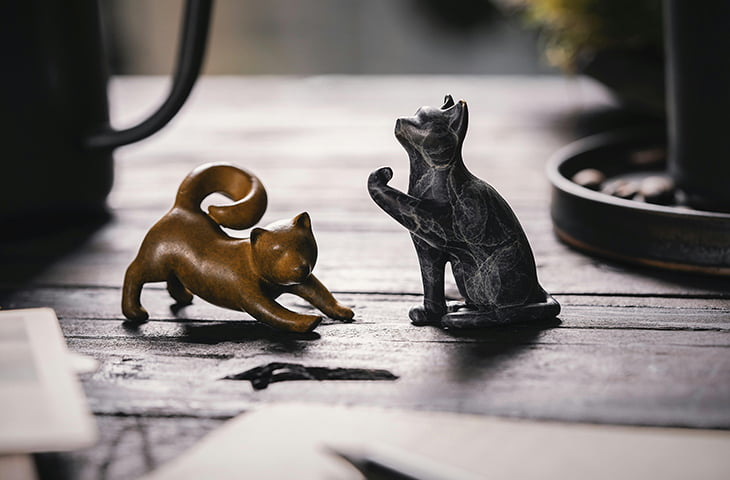7 Ways To Improve Your Senior Dog’s Health And Well-being

Senior dogs need extra care to stay healthy and happy as long as possible and this guide shows how to improve senior dog health and well-being.
As our dogs enter the final stages of their lives, we often notice changes in their habits, behavior and overall health. Watching your dog get more tired, sensitive, and slow can be an unsettling experience, but there are many ways to help him navigate his senior years comfortably and safely, and with good quality of life. Let’s explore seven ways you can support and learn how to improve senior dog health and well-being through his twilight years.
1. Give him quality nutrition
A healthy balanced diet is as crucial for your dog as it is for you, especially as he ages.
- Give him a high quality, easy-to-digest food made from wholesome ingredients and no chemical preservatives or other synthetic ingredients.
- You may have read that senior dogs don’t need as much protein, but that’s not necessarily true. Quality protein should still be the focal point of your dog’s diet, although older canines don’t normally need as many calories as young active dogs. Usually, it just means your dog will need to eat a bit less than he used to. In any case, make sure to keep an eye on his weight and adjust his diet as needed with the help of your veterinarian.
- A nutritious diet also includes any necessary supplements. For example, Omega-3 fatty acids and joint-supportive supplements such as glucosamine and chondroitin can help ease the discomfort of arthritis. Omega-3s can also help protect against cognitive decline, while probiotics may assist with digestion. Antioxidants support the immune system and reduce oxidative damage in the body.
Quality protein should still be the focal point of your senior dog’s diet, although older canines don’t normally need as many calories as young active dogs.
2. Make sure he has a comfortable living space
- All dogs sleep a lot, but senior dogs tend to sleep even more. So make sure you offer your older dog a comfy bed in a quiet spot so he can nap whenever he needs to. A thick memory foam mattress is a great idea — quality memory foam provides support for aging joints, while also being soft enough to make your dog feel comfortable. Bedding and pillows can make the bed feel even easier to lie on.
- If your dog develops mobility issues, consider ramps or steps to help him reach higher surfaces such as your bed, the sofa, or the backset of your car. Make sure his bed, bowls and toys are in accessible areas that don’t require him to climb a lot of stairs.
- Some dogs develop vision problems as they age, which means it’s important not to move your furniture around or leave anything in the middle of the floor where he might bump into or trip over it.
3. Provide gentle exercise
While the energetic play of your dog’s youth may be a distant memory, regular gentle exercise remains essential. Even though he might be getting lazy, it’s still important for him to remain fit — perhaps even more important than ever to improve senior dog health and well-being.
- Consider low-impact activities such as short walks, swimming, or easygoing play sessions. For example, if your dog still likes to chase a ball, don’t throw it far and keep the game short. Tailor the exercise routine to your dog’s individual needs and limitations, so that it promotes mobility and helps him maintain a healthy weight without causing injury.
- Rehabilitation techniques, such as walking on an underwater treadmill, can also be helpful for older dogs, especially those with stiff joints.
4. Stimulate his mind
Keeping your aging dog’s mind engaged is crucial for good cognitive health.
- Puzzle toys and interactive games can be a great way to keep your dog active even if he doesn’t have a lot of energy left for physical exercise.
- Incorporating scent into playtime can be particularly beneficial for senior dogs because it caters to their sensory needs. Snuffle mats are one easy way to achieve this – they’re designed with hidden pockets for treats that your dog has to sniff out.
- The cup game is another excellent option for mental stimulation. It involves hiding a treat under one of several cups and then shuffling them around. Your dog must use his nose and cognitive abilities to track the scent and find the hidden treat, adding an extra layer of mental challenge.
5. Take him for regular veterinary checkups
Frequent veterinary check-ups are important for catching any potential health issues early on, including heart or kidney disease, cognitive decline, problems with vision or hearing, etc. Many dogs start showing symptoms of chronic conditions when they get older, and keeping a trusted vet in the loop is vital. A checkup at least twice a year is a good idea, even if you don’t notice any obvious problems.
A checkup at least twice a year is a good idea, even if you don’t notice any obvious problems.
6. Take advantage of holistic therapies
Many natural therapies can contribute to your dog’s well-being.
- Along with supplements and rehabilitation, modalities such as acupuncture, acupressure, chiropractic, massage and more can benefit an aging canine.
- A variety of herbal remedies can also be helpful for everything from pain management to urinary tract issues to immune support, although it’s important to work with an integrative or holistic veterinarian who is knowledgeable about the use of herbs for dogs.
- Turmeric is known to have anti-inflammatory effects and can be great for dogs who suffer from stiff joints.
- Ginger or peppermint can settle an upset tea.
- Therapeutic grade essential oils, such as chamomile and lavender, can calm anxiety.
7. Give him lots of unconditional love and attention
Perhaps the most crucial gift you can give your senior dog during his twilight years is to provide him with plenty of emotional support and attention. Spend quality time together, offer gentle affection, and be attuned to any changes in his health or behavior. Your presence and love is what he needs the most at this stage of his life, and will bring him immense comfort and security as he gets older.
The post 7 ways to improve your senior dog’s health and well-being appeared first on Animal Wellness Magazine.


